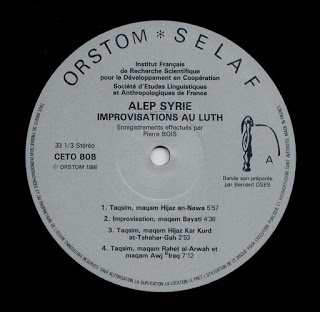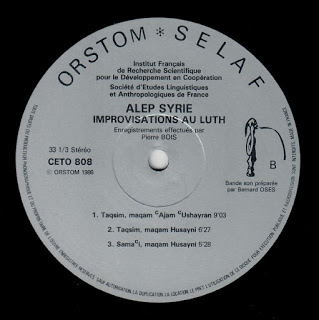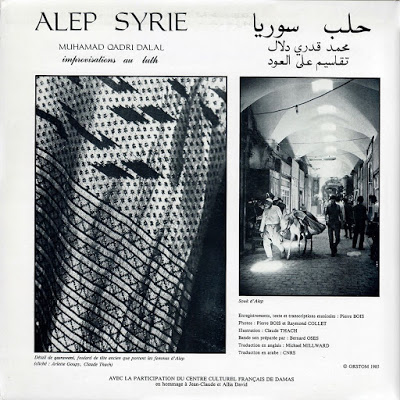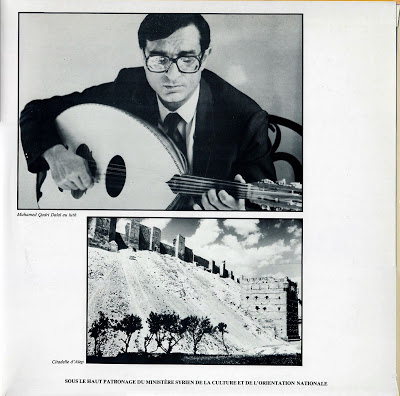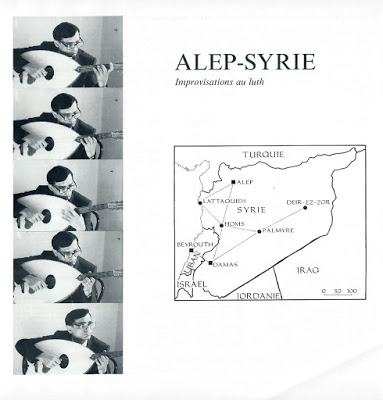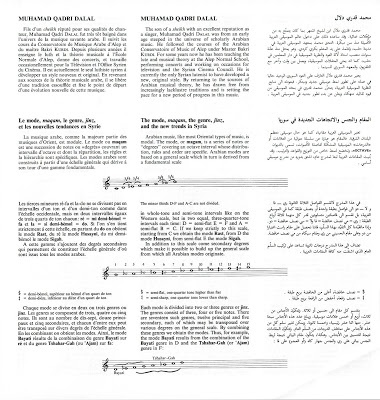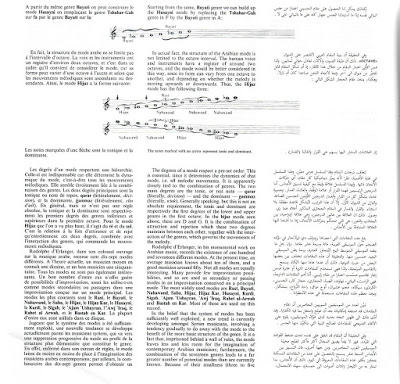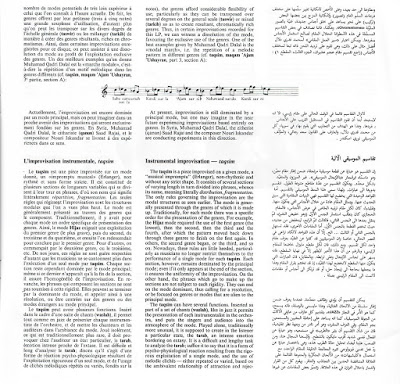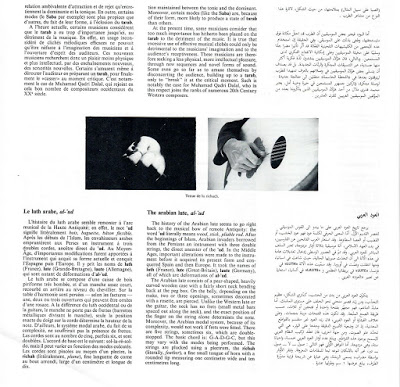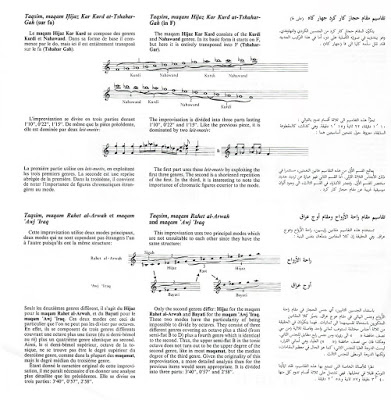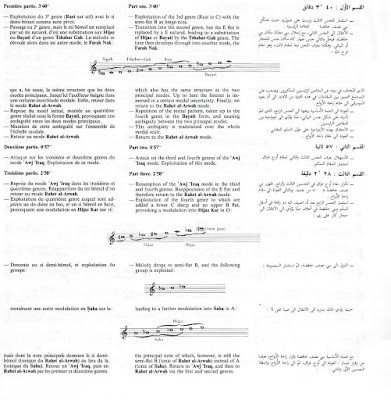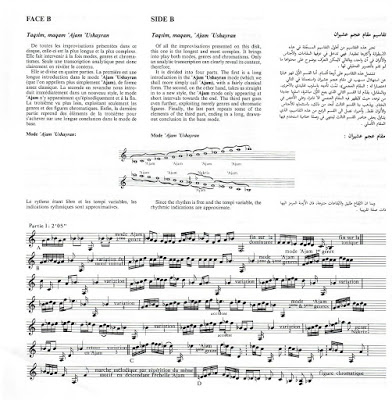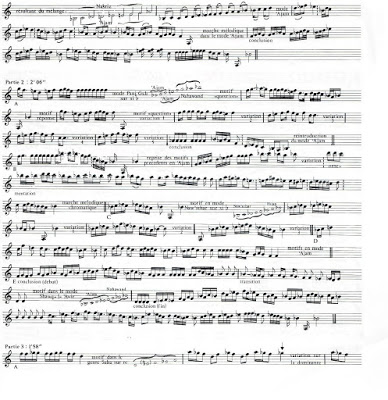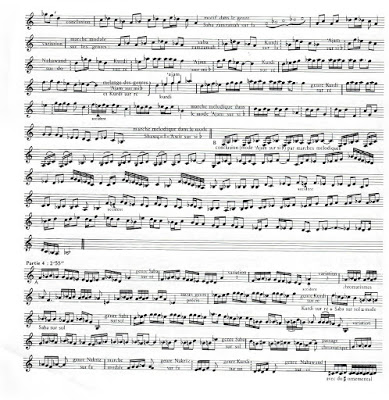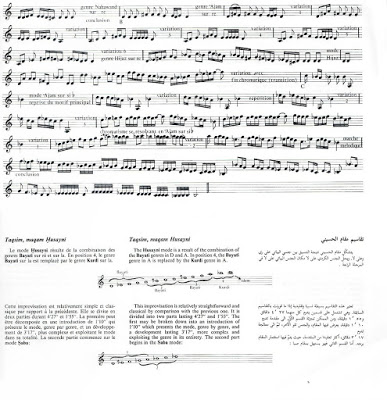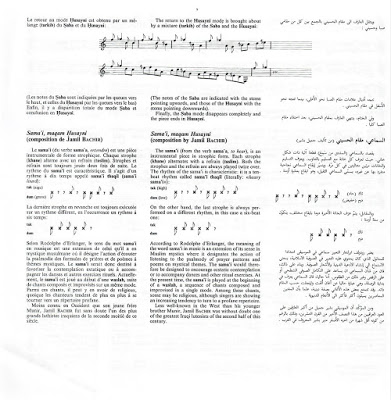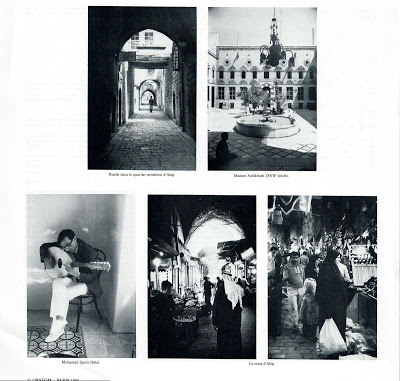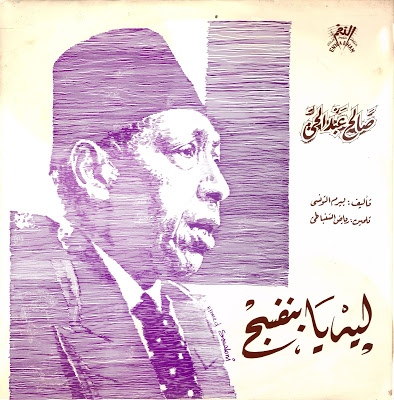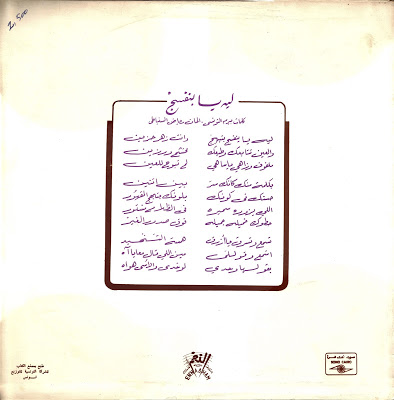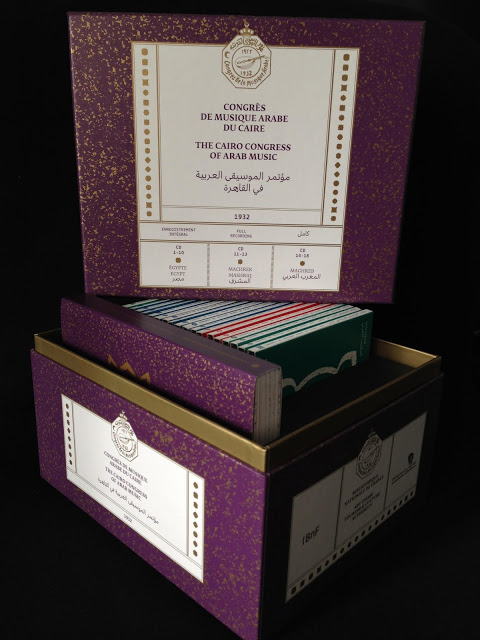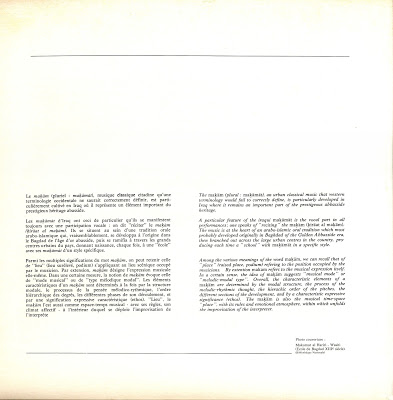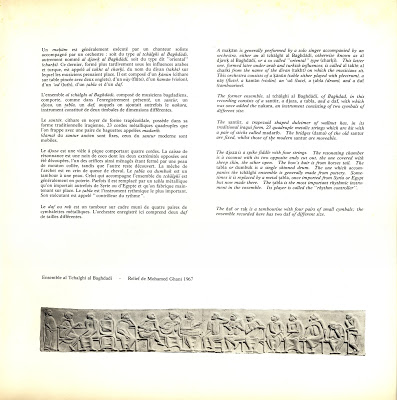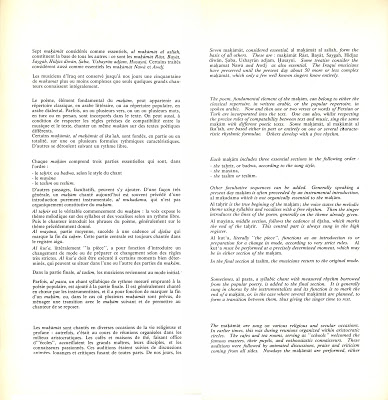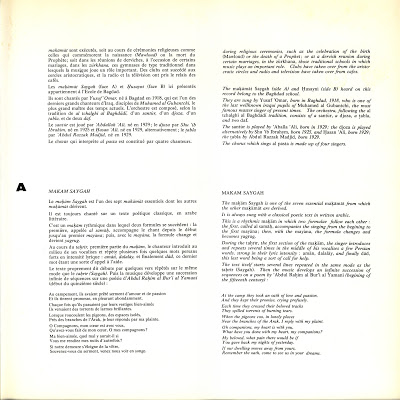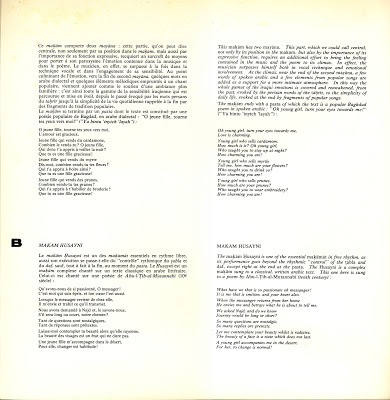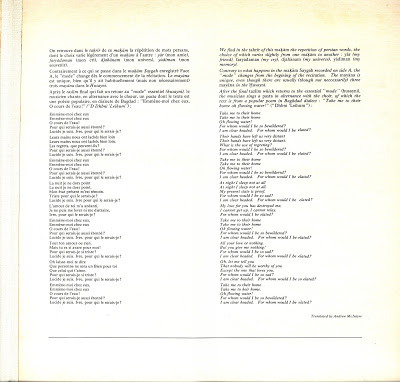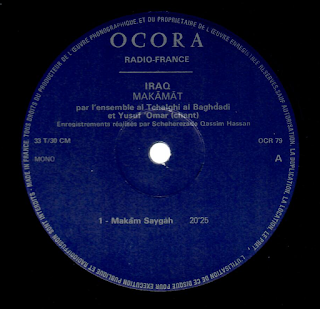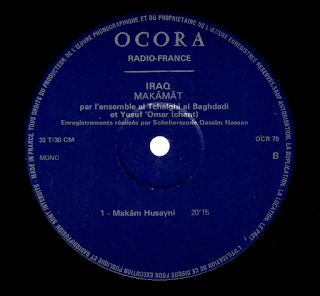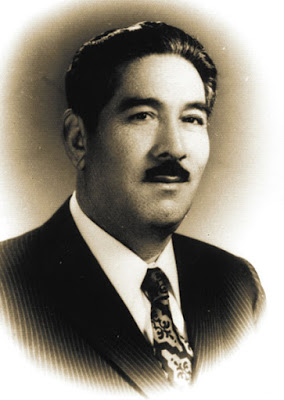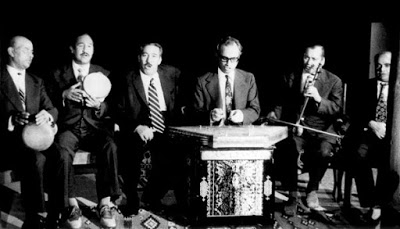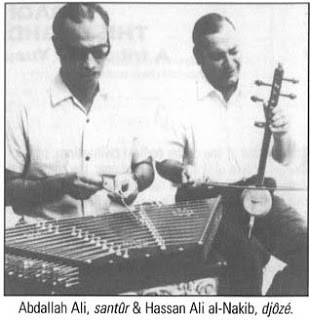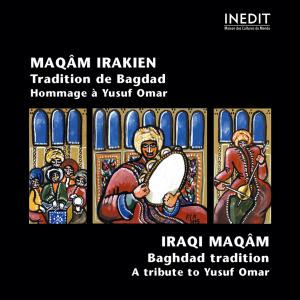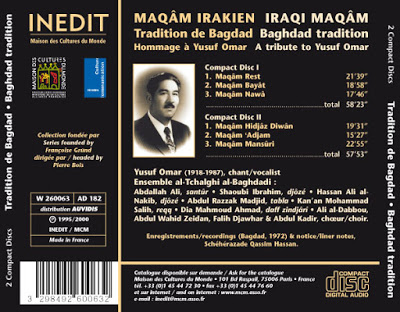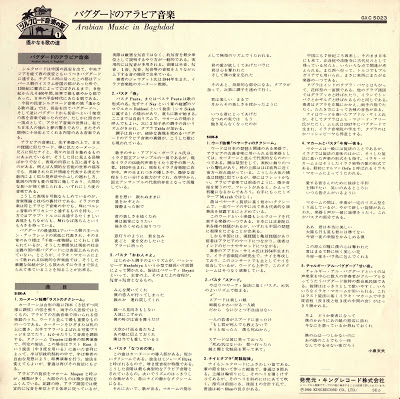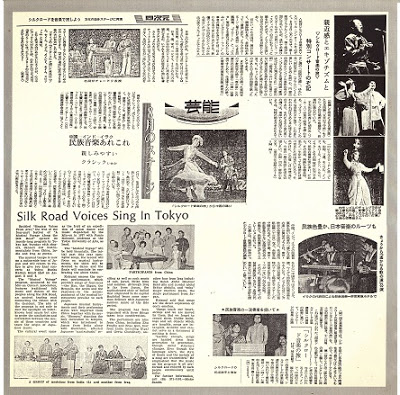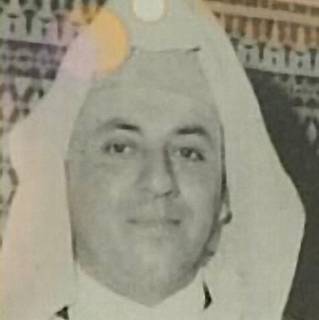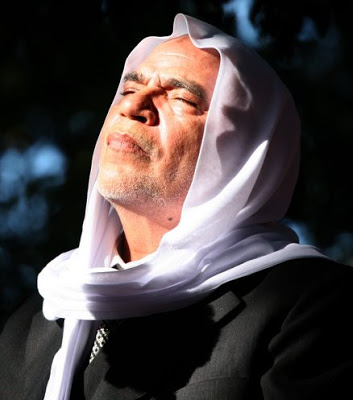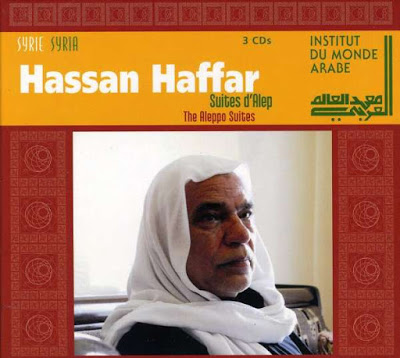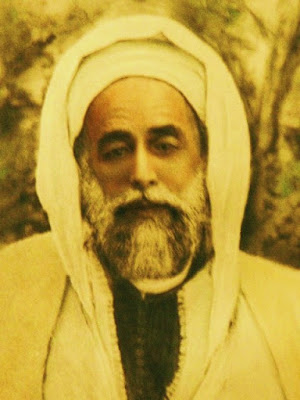Here an LP by the well-known master of the 'Ud, well-known through his participation in the famous Al Kindi Ensemble, which toured Europe and other parts of the world extensively and published quite a number of CDs, mostly accompanying legendary singers like Sabri Moudallal, Adib al-Dayikh and Hamza Shakkur. He also has a solo CD released by the Inédit label (see here).
Tuesday, 11 July 2017
Thursday, 6 July 2017
Salah Abd al-Hayy (1896-1962) - Lih Ya Binafsaj (Why are you pale?) - LP published in Egypt
Salah Abd al-Hayy was the last outstanding Egyptian singer of classical
Arabic music as it was performed around the turn of the century by great singers
like Yūsuf al-Manyalāwī (1847-1911), his uncle ‘Abd al-Ḥayy Ḥilmī (1857-1912) and Sayyid
al-Ṣaftī (1875-1939). During his lifetime Egytian music went through quite drastic changes, personified by the famous Om Kalthoum. Salah Abd al-Hayy seems to have been the only singer who refused the huge orchestras of the time and stuck to the small classical arab ensemble, the Takht, consisting of 'Ud, Qanun, Ney, violin, and one or two percussionists.
He also stuck to the classic Wasla (Maqam suite) consisting of a metrical introduction, a Taqsim (non-metrical instrumental improvisation on 'Ud or Qanun), a Layali (a great non-metrical vocal improvisation supported by an 'Ud or Qanun) and some metrical compositions at the end.
Unfortunately this music seems hardly to exist since after his death anymore in Egypt, except in a very marginal way. See for example the beautiful piece by Ibrahim El-Haggar here. We will post a broadcast by him in the future.
Here we present an old LP - I have no idea when it was released: maybe in the 1950s or 1960s - with one of his well-known compositions in the Wasla format. The piece covers both sides.
"Born in Cairo to a family of musicians (his uncle was ̕Abd al-Hay Hilmî),
he was trained with the Sahbageyya groups and then with the Muhammad ̕ Umar and
̕Ali al-Rashidi groups. He started his career with his uncle’s repertoire. He
reached his glory in the middle of the 1920s. His powerful and moving voice made
him the last brilliant representative of the Khedivial aesthetics in its
improvising dimension. An ardent defender of the takht, he was the first singer
broadcasted on national radio in May 1934 without, however, renewing his
repertoire."
Around 15 or 20 years ago there existed some (I think 4) CDs by him, manufactured by the Saudi Arabian CD company Sidi. Nowadays one can't find them anymore anywhere.
But in the internet one can find many recordings by him: on all the downloading and streaming sites (Amazon, Deezer, Qobuz (flac format) etc.) and also on YouTube, especially if one puts in his name with arabic letters: صالح عبد الحي
About the artist see:
A few years ago a wonderful set of four CDs by his
uncle Abd Al-Hayy Hilmi was published. It can be obtained from: info@raga-maqam-dastgah.com.
Abd Al-Hayy Hilmi (1857-1912) (Vocal) – An Anthology – Une Anthologie, Set
of 4 CDs containing 45 recordings + 1 booklet in English, French and
Arabic,
CD 1: Odeon 1903-1910 - Dawr - 'ahd el-ekhewwa (7:45), Dawr - gaddedi ya
nafsi hazzek (7:15), Dawr - sallemte ruhak (6:56), Muwashshah - ya nahif
al-qawam (3:46), Muwashshah - waghak mushriq (3:50), Taqtuqa - 'amara ya'ammura
(4:05), Dawr - el-hobbe sabbahni'adam (7:35), Dawr - enta farid fel-hosn (7:00),
Dawr - el-hosn ana'eshe'to (10:52), Dawr - fe maglis el-'ons el-hani (6:07),
Dawr - bustan gamalak (9:37).
CD 2: Zonophone / Early Gramophone 1906-1909 - Dawr - el-bolbol gani
(9:37), Dawr - ahin en-nafs (15:52), Dawr - ana 'a'sha'fi zamani (9:36), Dawr -
el-warde fo' wagnat bahiyy el-gamal (12:49), Muwashshah - atani zamani (10:26),
Dawr - la ya en (9:01), Mawwal - ya mufrad el-ghid (4:29), Qasida 'ala l-wahda -
fa-ya muhgati dhubi gawan (4:26).
CD 3: Late Gramophone (1909-1910) - Taqsim layali, taqtuqa - 'idil-yamin
(9:04), Taqtuqa - ya nakhleten fel-'alali (4:38), Taqsim layali, mawwal - ya
hadiya l-'is (8:44), Muwashshah - nahat fa-'agabtuha (4:40), Muwashshah - hati
ayyuha s-saqi (4:05), Qasida 'ala l-wahda - a-saqiyaya 'a-khamrun fi ku'usikuma
(3:55), Taqsim layali, mawwal - la tehsibu inn el-be'ad (4:04), Dawr - el''albe
dab es'efini (8:07), Taqsim layali, mawwal - sahi l-gefun (4:18), Mawwal - amr
el-gharam (4:03), Taqsim layali, qasida mursala - lla muhayyaka nuru l-badr
(8:16), Dawr - min habbak 'awla be-'urbak (6:19), Qasida 'ala l-wahda - a-la fi
sabili l-lah (6:26).
CD 4: Baidaphone 1911-1912 - Qasida 'ala-wahda - shakawtu fa-qalat (4:14),
Qasida mursala - a-lasta wa'adtani (4:14), Qasida 'ala l-wahda - araka 'asiyya
d-dam'i (8:09), Mawwal - sabah es-sabah (4:07), Qasida mursala - 'umri 'alayka
tashawwuqan (3:47), Dawr - ma-ahebbe gherak (10:45), Mawwal - ya di 'l-gamal
wed-dalal (3:18), Muwashshah - ya laylu 'inna l-habiba wafa & muwashshah -
gusnu banin gabinuhu (7:01), Du'a - ye'ish khedewi masr (7:18), Dawr - ya masr'
unsek 'al (4:00), Muwashshah - ya akhal el-'en (4:13), Qasida mursala - tih
dalalan (4:01), Dawr - maliki ana 'abdak (7:20), AMAR - Foundation for Arab
Music Archiving and Research
”Abd al-Hayy Hilmi, a talismanic artist in a non-conformist style of the
Arab intellectual and cultural renaissance (the Nahda). At the turn of the 20th
century, he was the king of Tarab (music). He was maverick in life, just like
the way he sang. His personal versions of the songs that were the most performed
are surprisingly outspoken and free, illustrated by immediate compositional
improvisation. We present in this box set of 4 Cds, including 45 recordings
featuring all the styles Hilmi sang in and which further represent different
periods covering all the facets of this great singer’s artistry.
Abd al-Hay Hilmî, a seductive dandy, was the spoiled child of Egyptian high
society at the turn of the century. He was noted for his odd manners; he would
leave a concert he was hired for if he failed to notice a pleasant looking face,
be it male or female, in the audience, and preferred to sing for handsome
strangers. An obsessive drinker, he would also use various drugs to reach the
state of saltana necessary to unleash his extemporizing creativity. He ended up
worn by his excesses, which caused him an angina pectoris, and he died whilst
drunken in Alexandria after a feast of sea turtle.
A whimsical character in his life, as well as in his art, he was often
summing up the introduction and livening up the composed thread of the melody.
He would neglect entire sections so as to privilege one verse, one standstill in
a particular modal color to which he added a tragic and hallucinated touch,
displaying a wide range of virtuosic effects expressing emotions, shifting from
long melodic phrases to a jerky staccato, interrupting the instruments with
another dramatic piece of embroidery over the heady main theme. A self-taught
artist in learned tradition, Abd al-Hay Hilmî insisted on ignoring the rules.
His well-known lack of respect for rhythm and composition made him an easy
target for harsh criticism from rigorists who were subjugated by Western
patterns with their sanctification of the composer’s role. His passion naturally
finds its best expression in mawawil, where non metrical improvisation is the
only rule. In this field, he remains unmatchable.
A successful record-selling artist, he was first hired by Zonophone in 1906
cutting his best discs ever inspite of poor technical quality. He then
collaborated with the record companies installed in Egypt until his death, often
recording the same works many times a year for the British Gramophone, Odeon and
Baidaphon. A prodigal sybarite, he would receive from the companies important
amounts of money, squander it and then be forced to repay his debts in terms of
recordings. This is why, once, he mischievously added at the end of a qasîda
rimed curses against the Gramophone Company, that went unnoticed.”
Wednesday, 5 July 2017
CONGRÈS DE MUSIQUE ARABE DU CAIRE 1932 - THE CAIRO CONGRESS OF ARAB MUSIC 1932
Here an importent release which might have gone unnoticed by many music lovers. It contains, amongst other jewels, two and half CDs by the great master of Iraqi Maqam Muhammad al-Qubbanji.
CONGRÈS DE MUSIQUE ARABE DU CAIRE 1932 - THE CAIRO CONGRESS OF
ARAB MUSIC 1932 - Coffret 18 CD avec livret trilingue français, anglais et
arabe de 256 pages - Box of 18 CDs with a book of 256 pages in
French, English and Arabic - Sous la direction de Jean Lambert et de Pascal
Cordereix, Texte original de Bernard Moussali, Restauration sonore par Luc
Verrier, CDs 1 to 10: Egypt, CDs 11 to 13: Mashriq (Near East), CDs 14 to 18:
Maghreb (North Africa), LA BIBLIOTHÈQUE NATIONALE DE FRANCE
This box can be obtained from info@raga-maqam-dastgah.com for € 199,00 including postage.
"Le Congrès du Caire de 1932 est un mythe pour tous les
chercheurs et les amateurs de la musique arabe en particulier et de la musique
en général. Rares étaient ceux qui avaient, jusqu’à cette édition, accès à ces
enregistrements. Après un important travail de restauration du son effectué
dans ses studios, la BnF, en collaboration avec l’émirat d’Abou Dhabi, et sous
la direction scientifique de Jean Lambert (Centre de recherche en
ethnomusicologie), publie l’intégralité des enregistrements du Congrès du
Caire, authentique document d’archives sonores de plus de dix-huit heures de
musique, soit 18 disques compacts accompagnés d’un livret descriptif de 256
pages.
Le Congrès de musique arabe qui s’est tenu au Caire en mars-avril
1932 a fait date dans l’histoire de la musique au XXe siècle. Première
manifestation scientifique d’envergure consacrée à des musiques non
occidentales, il a permis la rencontre entre musicologues occidentaux et
orientaux. Il est le premier congrès de musicologie à consacrer une part importante
de ses travaux à l’enregistrement sonore d’interprétations de référence. C’est
dans ce cadre que la filiale égyptienne de la firme His Master’s Voice de la
Gramophone anglaise enregistre 334 faces de disques 78 tours, enregistrements
non destinés à l'époque à une diffusion commerciale. Quatre-vingt-deux ans plus
tard, l’art et le savoir de grands musiciens du monde arabe deviennent
accessibles.
Il
s’agit de la première manifestation scientifique d’envergure consacrée à des
musique savantes non occidentales. Le Roi Farouck d’Egypte avait confié
l’organisation au musicologue Franco-Britannique Le Baron Rodolphe François
d’Erlanger. Ce congrès du Caire 1932 à fait date dans l’histoire de la musiques
du XX siècle."
It is for the first time that the complete recordings of this
historical event are published. In the 1990s there existed 5 CDs (Morocco,
Algeria, Tunisia & Iraq) published by Club du Disque Arabe and a double CD
published by Institut du Monde Arabe. These are no longer available for more
than 10 or 15 years. This is truly an outstanding publication for lovers of
classical Arab music.
Sunday, 2 July 2017
Iraq - Makamat par l'Ensemble Al Tchālghī Al Baghdādī et Yusuf Omar (1918-1987) – LP published in France in 1972
Yusuf Omar was, next to Muhammad al-Qubbanji, the greatest Maqam singer of the past century in Iraq. This singer and especially this recording is the crown of Iraqi Maqam music and Maqam music in general. I discovered this great singer and this great musical tradition with this LP shortly after it was released. It was amongst the very first LPs - I think the second - of Arabic music I have. This LP was later released as a CD with an additional track, unfortunately no longer available for many years.
The scans of the booklet inside this gatefold LP I took from an earlier post of this LP somewhere in the internet. I don't remember anymore where that was.
In 1995 a fantastic double CD was published by Inédit - Maison des Cultures du Monde in Paris. It can be obtained from their website:
In the booklet to this double CD one can find good information about this tradition and the singer and his musicians. This booklet can be downloaded here.
Tuesday, 27 June 2017
Maqam-Al-Iraqi - Three concerts in Bonn, Cologne and Baghdad broadcast in 1977, 1978 & 1979 by WDR, Cologne, Germany
Here our second post in our series of recordings of the Maqam music of Iraq. Here we have longer Maqam suites which give a much better impression of this great musical tradition.
Many thanks to our friend KF who recorded these broadcasts, made a double CD out of them and created the covers. Many thanks for sharing them generously.
Sunday, 25 June 2017
Arabian Music in Baghdad - LP published in Japan in 1980
With this LP we start a series of three posts of the Maqam Music of Iraq - Maqam al-Iraqi. In 2011 we posted already an LP having a recording by the same singer as on this LP here. See here.
Iraqi Maqam is one of the great Maqam traditions. In some respects it has some affinities to the Mugham music of Azerbaijan and to Dastgah music of Iran, but it is for sure through and through Arabic. I discovered this music in the first half of the 1970s with the legendary LP "Iraq - Makamat - L'Ensemble Al Tchalghi Al Baghdadi et Yusuf Omar" which we will post here as the third post in this series. For a long time there were hardly any other recordings available.
Here on this LP - which to my knowledge was never distributed in Europe or the US - we have mainly the lighter and more vivid and shorter pieces which in a performance are played usually towards the end. In the next two posts we will have the serious longer Maqam performances. Here the singer is also accompanied by a Takht ensemble as it is used normally in Maqam music in Egypt and other Near Eastern countries. In Iraq this a more recent development. Normally the Maqam music is accompanied by the Chalghi Al Baghdadi ensemble consistung of a Santour player, a Djoze player and two or three percussionists, as we will have it in the next two posts.
The singer on this LP is Salah Abdel Ghafour (1952-2012). In the 1970s he toured quite frequently also outside of Iraq. In our next post we will have three broadcasts with him from 1977, 1978 and 1979 done by the WDR in Cologne, Germany.
Later he seems to have turned more into a singer of popular music.
"Iraqi artist Salah Abdel Ghafour was killed in a road accident in the Iraqi
city of Irbil on Sunday evening, April 7, 2012. A medical source said the late
singer was injured and hospitalized following a road accident, and passed away
at the hospital. Salah Abdul Ghafour was born in 1952 in Al Saadiya district in
Diyala Province in Iraq. He was of Kurdish origin. Abdul Ghafour applied to the
TV and Radio auditions in 1961 via the program "Rukn Al Huwaa" (Amateurs'
Corner), he was only 8 years old at the time. He rose to fame by singing the
songs of renowned Iraqi artist Nathem Al Ghazali. In 1973, he joined the
National Troupe for Folklore Arts, and later became a member of the Iraqi Inshad
Troupe. For the next four years, he participated in a number of festivals and
celebrations in Iraq and abroad. In 1977, he joined the Institute of Musical
Studies as a student, where he specialized in the Iraqi Maqam and in playing the
violin. Six years later, he graduated from the institute and joined the Iraqi
Musical Heritage Troupe, founded by the late Mounir Bashir, whereby he took part
in many Arab and international festivals and concerts. The song he is most
famous for is "Helwa Yal Baghdadiya" (Pretty Baghdadi Girl), the music of which
was composed by Nathem Naeem. Some of his most popular hits include "Mou
Beedaya" (Out of My Hands), music by composer Mohamed Noushi; "Ridt Ansak" (I
Wanted to Forget You), music by composer Farouq Hilal; "Kulman Yahin Lahla"
(Whoever Yearns for their Family) and "Khasartak Habibi" ( I Lost You My
Darling), music by composer Jaafar Al Khafaf. Song artist Salah Abdul Ghafour
made more than 30 albums and 300 songs, including the Iraqi Maqam and Iraqi
heritage songs. In addition, he had many national and love songs. Many artists
performed his songs, the most famous of which is veteran Turkish singer Ibrahim
Tatlises, who performed the song "Shlonak Ainy Shlonak" (How are you my love?).
Abdul Ghafour's most famous hits include "Helwa Yal Baghdadiya" (Pretty Baghdadi
Girl), "Khasartak Habibi" ( I Lost You My Darling), "La Tulomony" ( Do Not Blame
Me), "Anta Al Ghaltan" (You Are Mistaken), "Kul Yom Lak Mee'ad" ( You Have a
Time Every Day) and "Il'ab Yal Asmar" ( Play You Dark-toned One)."
From: http://www.alowaisnet.org/en/news/slahairaq.aspx
About Iraqi Maqam music see:
A blog devoted to Iraqi Maqam with many many historical recordings:
Tuesday, 20 June 2017
Abdel Hamid Hussain (1932-1992) - Qur'an Karim - Warsh Recitation from Morocco - Cassette, probably from the 1980s, published in Morocco
Another wellknown Qur'an reciter (Qari) from Morocco. He represents a style quite different from the very beautiful one of the outstanding Haj Abd er-Rahman ben Moussa, of whom we posted eight cassettes (see here).
This is the only cassette by Abdel Hamid Hussain we have. Warsh is the version (or reading) of the Qur'an used in Morocco.
On YouTube one can find a complete Qur'an by him:
Sunday, 18 June 2017
Hassan Haffar - Cassette from Syria
Hassan Haffar, who was part of the "Muezzins d'Alep" of our previous post, is one of the most famous Munshidin (singers of religious or Sufi songs) of recent decades in Aleppo, Syria. He toured a couple of times in the west, especially in France, where two CDs were released, and at the Fez Festival. See below one of the CDs.
Our dear friend Danny bought this cassette many years ago in Syria and was so kind to share it with us. Many thanks to him.
In France this fantastic set of 3 CDs was released in 2009. As always it can be obtained from: info@raga-maqam-dastgah.com
Hassan Haffar (Vocal) - Suites d'Alep - The Aleppo Suites, 3 CDs, CD 1:
Suites dans les modes Yekah, Nahawand & Rast (47:27), CD 2: Suites dans les
modes Hijaz, Zanjaran, 'Ajam & Sikah (47:14), CD 3: Suites dans les modes
Kurd, Bayati, Bastanikar & Nakriz (48:09), INSTITUT DU MONDE ARABE, IMA
321.082-84
With an excellent booklet in French, English & Arabic including the
sung poems.
„Hassan Haffar is the soloist in the eleven 'Aleppo Suites' presented here,
performing with great freedom of expression. His musical and vocal skills blend
introspection and sensuality and these three albums confirm him to be a master
of the genre...Muezzin at the Great Mosque in Aleppo, Hassan Haffar was born in
the city in 1943. A true craftsman, he was singled out for the quality,
precision and strength of his voice. He was the pupil of the hymnodists Bakri
Kurdi, Sabri Mudallal and 'Abd Al Ra'uf Hallaq...Accompanied by a chorus made up
of his pupils he entrances the listener with the rich fullness of his lower
register and the precision of his upper register. His brillant range and vocal
power do not, however, exclude a rare subtlety and an exquisite refinement... “
Thursday, 15 June 2017
Syrie - Vol. 1 - Muezzins d'Alep - Chants Religieux de l'Islam - LP published 1980 in France
Here a wonderful LP of a group of Munshidin (religious or Sufi singers) from Aleppo, under the direction of the legendary Sabri Mudallal. Amongst them also the wellknown Hassan Haffar. We posted already three recordings by the great Sabri Mudallal (see here). We will post soon one of the many recordings by Hassan Haffar.
This LP was released later also on CD, but is no longer available since many years. A volume 2 was never published.
Wednesday, 7 June 2017
Algeria - Shaykh Al 'Alawi's Diwan recorded in Annaba - Cassette published in UK in the 1980s
Scheich Ahmad al-Alawi (1869-1934)
On Sheikh al-Alawi (qas) see:
and especially this site which contains a lot of material about the Sheikh:
Sunday, 4 June 2017
Mohammad al-Zahraoui - Sufi Songs (Sama') - Cassette published in Fes, Morocco
Since 27th of may it is Ramadan again. To celebrate it, especially the blessed nights, we post here some cassettes and LPs of Sufi ceremonies, Munshidin from Syria and Qur'an recitation.
First a cassette from Morocco, which I bought in an Islamic bookshop in Brussels in the late 1980s or early 1990s. It contains: Amdah (songs of praising Allah) & Dhikr (remembrance of Allah), Mouloud an-Nabi (celebration of the birthday of the Prophet (saws)) and Wafa ar-Rasoul (?) (I don't know what this means exactly). This is a typical repertoire as it is sung in the first part of a Majlis, a Sufi gathering.
Labels:
Dhikr,
Fes,
Mohammad al-Zahraoui,
Morocco,
Sama',
Sufi singing,
Zikr
Thursday, 1 June 2017
Alla Rakha Khan (1919-2000) - Tabla - LP released in Pakistan in 1973
Here a rare LP from Pakistan by the great Ustad Alla Rakha.
Sarangi Lehra is by Ustad Nathu Khan.
Subscribe to:
Posts (Atom)

